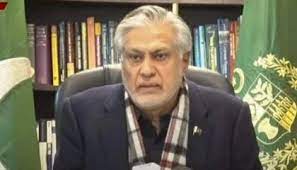Ishaq Dar categorically refutes default speculations; holds PTI responsible for ‘precarious situation’

Islamabad: Federal Minister for Finance and Revenue Senator Mohammad Ishaq Dar on Friday said that though the country was passing through a precarious situation that there was no chance of default.
He said the current economic situation was due to the “mismanagement and bad governance of the former Pakistan Tehreek-e-Insaf’s government” spanning for forty-two months.
Addressing a press conference here, the minister said that Pakistan would never default. “Yes, we are in a precarious position as reserves held by the State Bank of Pakistan (SBP) depleted to $2.8 billion. Although the total national reserves were still at $ 9 billion as commercial banks were holding around $5.5 billion,” the minister sketched out the current economic situation which requires external inflows to make debt repayments.
He said the incumbent government would take the country out of the said quagmire, adding it had a road map as well as the policy to do it, arguing that if the country had not defaulted till now, he reasoned that there was something that government was working with a plan to ward off any possibility of economic default.
He said it was strange that Imran Khan had been talking about default despite the fact that he himself was responsible for bringing the economy to this position during his 42-month government.
“Imran Khan has left no stone unturned towards default, the minister blamed the PTI chief, also accusing that Imran was ready to sacrifice the country for his petty politics.
He advised the PTI leader to show a sense of responsibility, adding that whenever the former premier tweeted or gave a statement, it had “damaged the country”.
“At a time when the IMF is about to conclude its review, Imran Khan is giving such statements only to allegedly sabotage the IMF deal, reminiscent of when he forced his [former] provincial finance ministers to declare their respective provinces had no finances to meet,” the minister alleged while recalling the audio-call leak when the former finance minister Shaukat Tarin was purportedly found giving aforementioned directions in an alleged attempt to sabotage the IMF deal, last year.
“It was his finance minister who talked to the provincial finance ministers advising them not to cooperate with the federal government and let not the tranche due by International Monetary Fund (IMF) to be released then,” he said.
He said, in other parts of the world, when any country had faced an issue of national interest, the opposition joined hands with the government to resolve it, however, he regretted that in Pakistan it was totally contrary to the said situation.
He said, instead of joining hands to think about how to steer through the crisis, Imran Khan only knew how to criticize the government and “inflict losses” on the country.
He said when the incumbent government assumed power, it was left with options either to save politics or the country, and it had chosen the latter one, which was an appreciable decision.
Dar said that the economic situation of the country should not be viewed separately rather it should be analyzed keeping in view th eglobal inflation and catastrophic floods in the country. He regretted that Pakistan had to spend billion of dollars on importing wheat, fertilizer, and even pulses despite the fact Pakistan is an agricultural land.
On the other hand, the minister said the floods caused around $30 billion in losses and hundred of billion of rupees were spent for immediate rescue and relief. He said the country needed around $16 billion for the next three to four years, out of which Pakistan would manage half of the amount whereas the remaining would be given by donors.
Ishaq Dar said that the average Gross Domestic Products (GDP) growth during the PML-N tenure from 2013 to 2018 was 4.7% while the PTI government’s average GDP growth was only 3.5%. He said the minimum food inflation during the PML–N tenure was 2.1% and that of PTI’s government was 6.1% and it peaked at 13.6% when they were ousted from power.
The minister added the PDM government had to repay under the debt servicing valuing up to $5.5 billion due to which the foreign exchange reserves were depleted to low levels.
He said Pakistan had recently received US 700 million from China which helped in shoring up the foreign reserves of the country. With respect to the public debt liabilities, the minister added t the PTI government increased the debt from Rs 30 trillion in 2018 to Rs 54 trillion, which he said was an exorbitant rise of 79% in four years.
He said mismanagement was the main reason behind this piling up of public liabilities.
Similarly, he said the debt-to-GDP ratio was 63.6% in 2018 while it rose to 73% when the PTI government left. However, he said the current PDM government had improved the debt-to-GDP ratio by over 3% as it had come down to 69.7% now.
Ishaq Dar said the country’s external liabilities in June 2018 were US$95 billion while it jumped by $35 billion to $130 billion in June, 2022. He said for the first time in recent history, the supplementary budget was not meant for bridging the tax target set for a fiscal year but the main reason was to overcome the energy debts.





